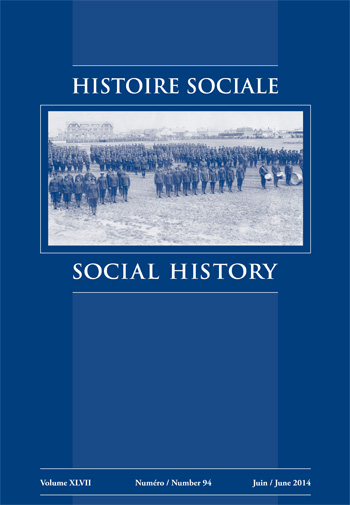For Kin and County: Scale, Identity, and English-Canadian Voluntary Societies, 1914-1918
DOI:
https://doi.org/10.1353/his.2014.0035Abstract
The impact of the First World War on Canadian identity has been understood in terms of victories won by soldiers on the battlefield such as Ypres and Vimy Ridge or the gains made by statesmen in the Imperial War Cabinet or at the Paris Peace Conference. This article explores the relationship between the war and identity through an examination of patriotic work performed on the Canadian home front. Both space and scale influenced the way English Canadians chose to coordinate their voluntary efforts for the war overseas and thus how they constructed the spatial boundaries of their imagined communities.
L’impact de la Première Guerre mondiale sur l’identité canadienne a généralement été mesuré à l’aune des victoires remportées par les soldats sur les champs de bataille, comme Ypres et la crête de Vimy, ou des acquis obtenus par les hommes d’État au Cabinet de guerre impérial ou à la Conférence de paix de Paris. Le présent article examine le rapport entre la guerre et l’identité sous la loupe du travail patriotique qui s’est réalisé au front intérieur, au Canada. La situation géographique tout autant que l’intensité des efforts ont influencé la façon dont la population canadienne-anglaise a choisi de coordonner ces mêmes efforts bénévoles à l’appui de la guerre outre-mer et, ainsi, la façon dont elle a tracé les limites spatiales de ses communautés imaginées.


